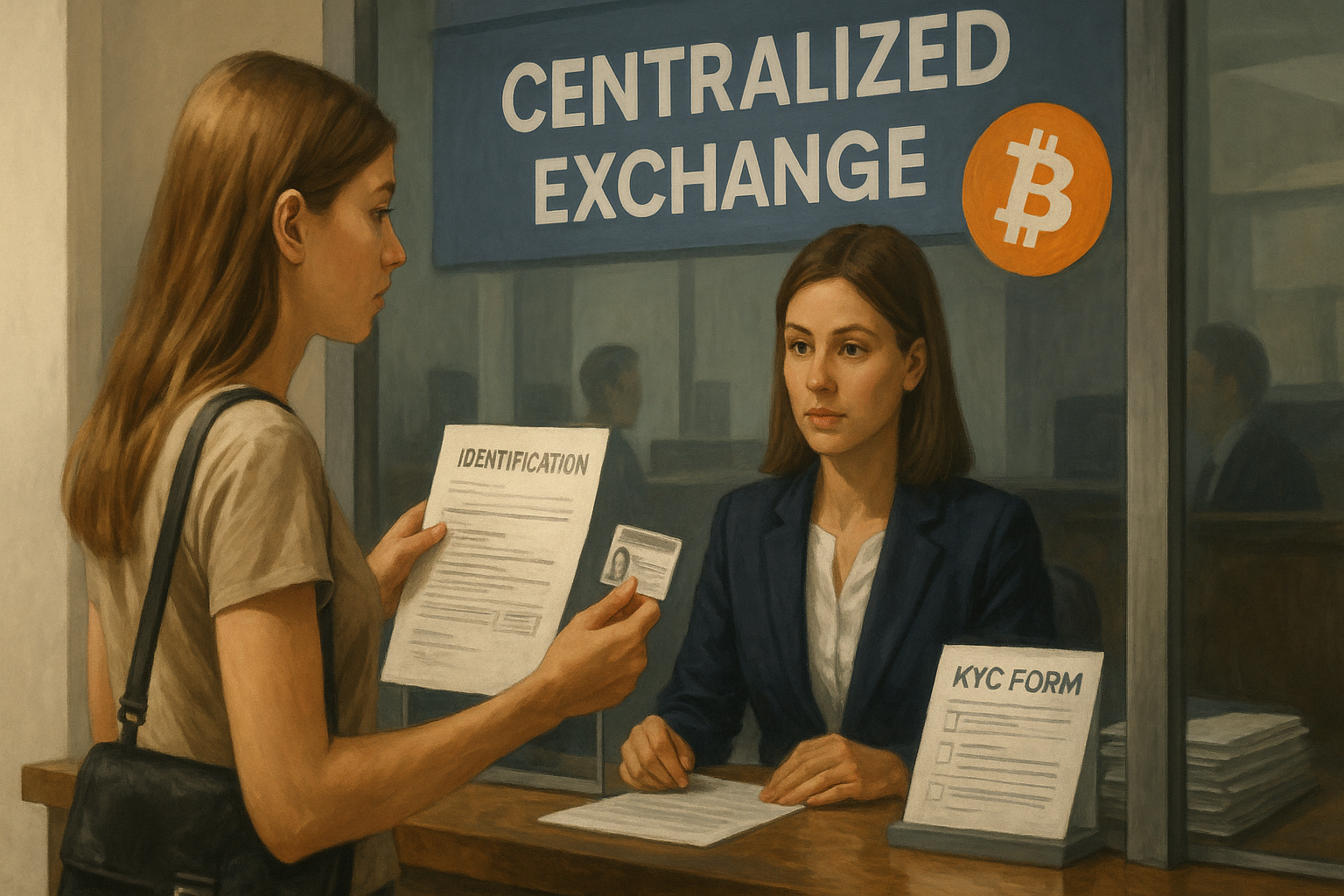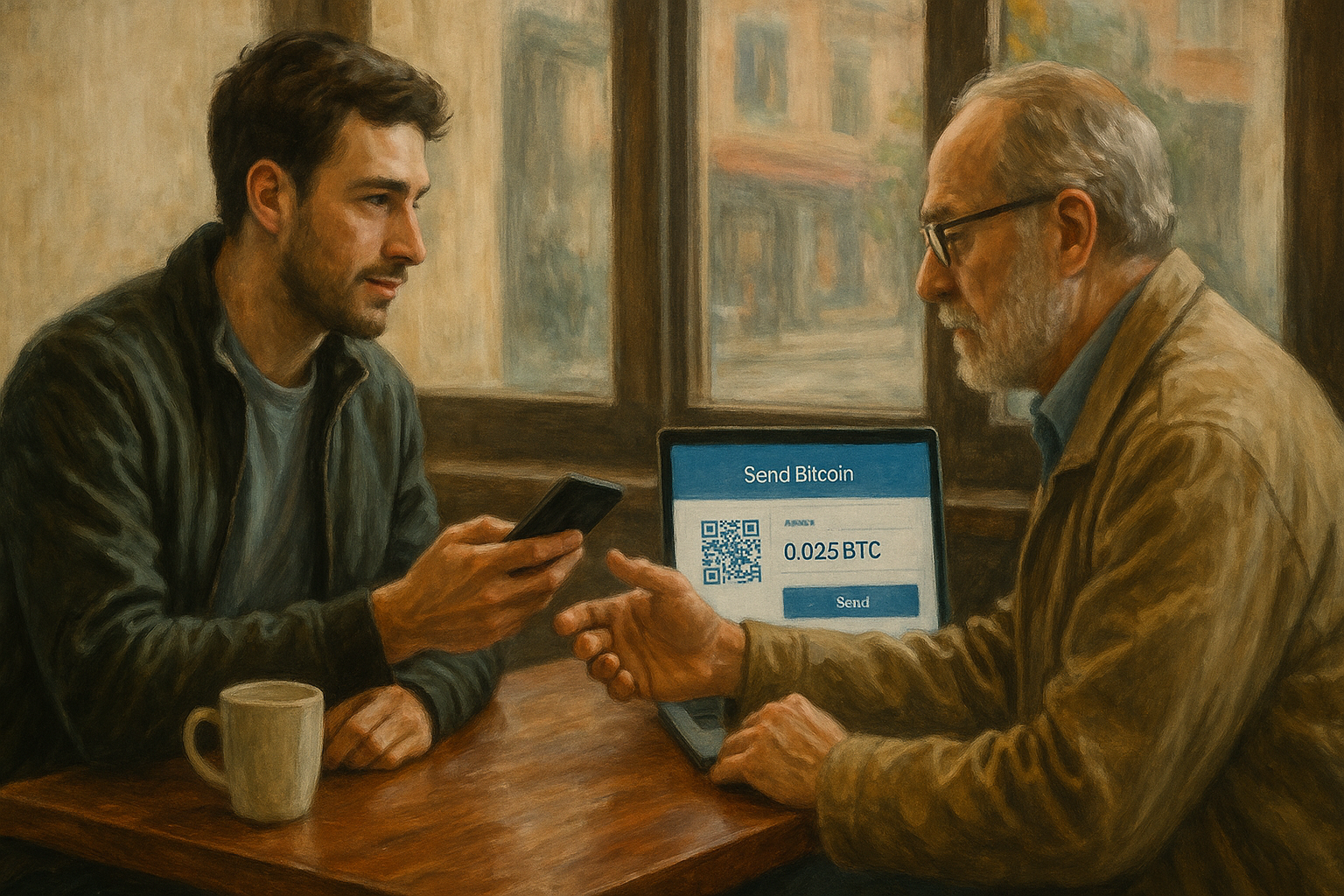9- Buying and selling Bitcoin
Now that you have a better understanding of the Bitcoin fundamentals, you should be ready to buy some.
Let me tell you something: buying BTC is the best way to use your fiat and, by now, I hope you are starting to see why.
There are several ways to convert your money into Bitcoin, depending on where you live and what your needs are.
Some methods are very straightforward, while others are more obscure and complex.
Whichever way you choose to go, you will only need two things: an internet connection and, of course, some fiat.
And no, you don’t necessarily have to use a bank account, as we’ll now see.
“Accessibility” is one of Bitcoin’s greatest strengths. Those who have been left out of the fiat system — good riddance — can still stack SATs!
Let’s start with…the notorious exchanges: a Bitcoiner’s worst nightmare, the antithesis of what this currency stands for.
🟠Exchanges: the new banks?
Centralized exchanges ,or CEXs, are the easiest and most conventional way to purchase Bitcoin.
Generally speaking, as a first-time buyer, that’s where you’ll start from.
The biggest names in the industry are Coinbase, Binance, and Kraken.
I’m sure you have come across these companies before: they are massive, powerful, and influential.
Simply put, an exchange is a financial institution that buys and sells Bitcoin.
These companies are happy to acquire your Bitcoin at any time, no matter the price — they are in fact similar to brokers and, more broadly, to banks, as they also allow you to “store” your Bitcoin on their platforms.
First red flag.
Purchasing BTC on an exchange is very easy and somewhat safe, given you are security-savvy and you do not fall for online scams.
Getting started is simple, and it involves a KYC (know-your-customer) process where you must provide all of your personal data and ID details.
Second red flag.
For this very reason, hardcore Bitcoiners stay well away from these platforms, and that’s because your anonymity — if that even exists anymore — and privacy are immediately compromised the moment you create an account with them.
Be aware: for legal reasons, bureaucracy, and all of that fun stuff, exchanges are required to record every transaction that takes place on their platforms.
We know that the government loves to be up to date on your finances, and this is no exception. Anytime you buy Bitcoin, you know it’s being reported to some sort of taxation agency.
This may not seem so bad at first. After all, what do I care if my government knows that I am holding Bitcoin?
Well, let’s take a quick trip to 1933, when U.S. president Roosevelt signed an executive order that forced citizens to surrender all of their gold and convert it into dollars.
After seizing it from the population, they re-valued gold from $20 to $35 per ounce, effectively robbing their people.
They knew exactly who bought gold and how much they held, and they went after them.
This was America — not a “banana republic”, not an obscure, strange and unheard of dictatorship. The “land of the free” turned authoritarian for a moment: don’t think it will never happen to your beloved first-world country either.
This was just an example. I’m not saying that your politicians will suddenly turn on you and try to confiscate your Bitcoin, but the chances are not 0.
Bottom line: if you can help it, try to keep your business as private as can be. Leave the government out of it — the less they know about your life, the better.
Farewell, privacy.
🟠Not your keys, not your coins
Once you create a profile and get your KYC approved, all you have to do is link your bank account to your exchange.
Simply initiate a bank transfer by moving the desired amount of fiat to the exchange, and use those funds to purchase Bitcoin.
Done. You just took your first step towards a better future.
Now, where is my freshly bought Bitcoin “kept”?
If you did your homework and learned what we said in the last chapter, you know that a transaction cannot be made without an address.
You also know that an address cannot exist without a wallet: your “keys manager”, that piece of software that’s held together by the seed phrase, the sacred master key.
In this case, when you are the buyer, the exchange is the sender and you are the receiver. And so, what address are you using? Is it one of your choice, or a fiat — by decree — address?
On most CEXs, as you set up an account, a wallet is automatically created for you, and you have no choice but to use it; these are called custodial wallets, and they are a Bitcoiner’s sworn enemy.
What this means is that the exchange, AKA a centralized, bank-like financial institution, is in possession — hence the word “custodial” — of your invaluable seed phrase.
Third red flag.
Let that sink in. The implications are massive: this is where Bitcoin’s values are flipped, insulted, and replaced. But I won’t digress for now — this is a story for a future chapter.
One of the most famous expressions in Bitcoin comes from here.
“Not your keys, not your coins”.
Don’t forget: owning Bitcoin is all about self-sovereignty and independence.
If someone else owns your wallet’s seed phrase and its corresponding keys, that money isn’t really yours, but theirs.
This is the idea behind the concept of self-custody, which is paramount, essential, and non-negotiable, if you are serious about Bitcoin.
But luckily, you don’t have to be a part of it.
While it’s true that you may be forced to use that silly custodial wallet to purchase Bitcoin off of the exchange, it’s imperative you immediately transfer your money to a more secure address; one that grants you full ownership and control. Don’t worry, we’ll talk about it.
Keeping Bitcoin in a custodial wallet is just like keeping your money in the bank: you are trusting a centralized financial company to manage and hold your funds for you, leaving you exposed to their shenanigans. Exchanges, just like banks, are notorious for freezing transactions, ghosting their customers, and leaving them in the dark when they need assistance.
But as much as I dislike them, exchanges are the most obvious way for you to start purchasing Bitcoin. It’s perfectly fine for you to use them, so don’t stress about it. As your journey progresses and values such as privacy become a priority, you will naturally move on to other methods, and find new ways to obtain your SATs. No rush.
Decentralized exchanges & Peer to peer
If you wish to keep your Bitcoin purchases under the radar, which is the case for many, a “decentralized exchange” is what you are after.
“DEXs” are, just like their centralized counterpart, platforms where users can buy or sell BTC. However, that’s where the similarities end.
These exchanges, like Bitcoin itself, are not run or governed by a central authority: they do, in fact, operate on open-source software that’s hosted on a widely distributed network.
There is usually no KYC, which means you are not required to give up all of your personal data and, moreover, you won’t be asked to use “their” custodial wallet.
Other types of decentralized exchanges, such as Bisq, are called “peer to peer” platforms: marketplaces where you are able to buy and sell Bitcoin directly from another person, with the exchange simply acting as the middle-man.
You browse listings where real people are putting their BTC up for sale and, after agreeing on the price, you settle the payment using a bank transfer, a gift card, cash-in-hand, PayPal or another method. As you can imagine, the process here is not as straightforward as clicking a “buy” button on Coinbase, and as a first-time buyer, you should probably avoid them until your Bitcoin know-how improves.
Given that there’s no authority or institution involved, there is also a small risk of being scammed, and you should always proceed with extreme caution. However, if anonymity is on top of your list, “P2P” is certainly the best way to buy Bitcoin, no doubt.
Accessing Bitcoin without using a bank account
This is where Bitcoin truly shines.
If you are from the “first world”, you probably won't ever need this.
But there are many countries, as we saw already, in which having a bank account is a luxury that not many people can claim, believe it or not.
In the “global south”, traditional banking is only for the privileged and, in such places, buying Bitcoin is not driven by speculation or the desire to “make money”, but by sheer necessity.
Buying Bitcoin from a real person: for many, this is the only way to do it.
War-torn, hyperinflated nations where citizens have no access to fiat money, or where currencies are imploding and collapsing at a quick rate; that’s where Bitcoin is needed the most.
But how can you get some, when you do not have a bank account? Is it even possible?
The answer is: yes, absolutely! There are ways, although less formal and official. Again, “peer to peer” is the answer.
In this day and age, finding alternative routes is not hard. On the aforementioned Bisq, for example, you can buy in your area and settle the purchase with cash.
You can find a local trader and buy directly from them.
There are many Telegram or Signal channels that connect real people wanting to buy or sell in person. If you know where to look, you will find them.
You can also use Bitcoin ATMs, which are becoming more and more popular in developing countries. Insert your cash inside the machine, buy Bitcoin, and send it to an address of your choice. Just make sure they are legit, and you are good to go.
Selling Bitcoin
“Never sell your Bitcoin”. Ok, on to the next chapter.
Jokes aside, get ready to hear this time and time again: Bitcoiners love it!
Selling your BTC can be done on the exact same platforms you bought it from: exchanges and peer to peer.
Keep in mind that, depending on where you live, you are likely required to pay taxes on your Bitcoin profits, when you exchange it for fiat.
Only a handful of countries, such as Germany or Portugal, have favourable laws where Bitcoin is not taxed. Everywhere else, sadly, you must pay anywhere between 10% and 40%. Ouch.
If you wish to “cash out” via CEXs (the most common way to do so), all you need to do is sell your Bitcoin to the exchange, and then transfer your fiat earnings to your associated bank account.
Before you do that, make sure your bank accepts this kind of transaction: many don't, and they often freeze, block or reverse transfers.
Given everything we talked about so far, though, I hope that selling Bitcoin is not something you are interested in doing, at least in the short term.
Remember: you are not selling Bitcoin, you are buying fiat.
This should intimidate you a little, and make you think twice before you part ways with your BTC.
You are trading in a form of money that is engineered to increase in value forever, for a dying and inflationary currency. Thanks, but no thanks.
Keep in mind: Bitcoin is not just an investment. It’s a tool for exiting the system, and for regaining financial freedom.
Please, do not sell it, just so you can buy a new car. Think of your future, and keep HODLING.
So, should I just hoard it? Like a dragon, greedy and jealous of his own stack? Or what? What do I do with my Bitcoin, if I shouldn’t sell it? Excellent question!
The truth is, you can taste your pie without eating it, and that’s what we are about to explore next: Bitcoin’s use cases.


